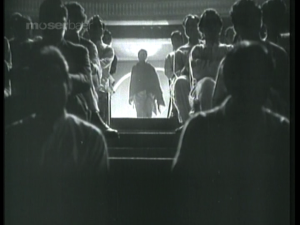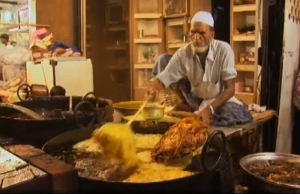My ten favourite kaun aayaa songs

I’m sure it must have happened to you as well. Sometimes you meet a person and the mere presence of this man/woman makes you feel good. You need not talk about overtly intelligent topics. You might not laugh heartily, but just being in the presence of that particular person makes you feel wonderful. It makes you feel as if you have experienced inner growth. Few days back, I again had such an experience, where I was left wondering: What was that? I was so elated, that I posted the song yeh aaj meri zindagi me kaun aa gaya on a forum I frequent, which gave me the idea for this post.
Unlike my last experience, the encounters making the characters of Hindi film exclaim “yeh kaun aayaa” are mostly of romantic nature. Some feel that spring has come, while others feel the moon has risen. Everybody has his or her own of exclaiming and rejoicing in this emotion. I personally think that a good song can convey more than the words themselves. So, enjoy my ten favourite kaun aayaa songs and tell me about yours.
Read the rest of this entry »
Tags: Anand Bakshi, Anoop Kumar, Asha Bhosle, Asha Parekh, Baazi [1951], Deepti Naval, Dekh Kabira Roya [1957], dekho yeh kaun aayaa, Dil Deke Dekho [1959], Farooque Sheikh, Geeta Dutt, imi Garewal, Imtihaan [1974], Indu Jain, Jawani Diwani [1972], Jaya Bhaduri, Kalpana Karthik, Katha [1983], kaun aayaa kaun aayaa, kaun aayaa ki nigahon me chamak jaag uthi, kaun aayaa mere man ke dwaare, kaun yeh aayaa mehfil me, Kishore Kumar, Lata Mangeshkar, Laxmikant-Pyarelal, Look who’s here!, Madan Mohan, Majrooh Sultanpuri, Manna Dey, Mohd. Rafi & Usha Khanna, Munshi Aarzoo, my ten favourite kaun aayaa songs, Nartaki [1939], Naseeruddin Shah, Naushad, Pankaj Mullick, Poonam Dhillon, R. D. Burman, Raaj Kumar, Raj Kamal, Rajendra Krishan, Rajendra Kumar, Randhir Kapoor, Ravi, rosha maati, roz shaam aati magar aisi na thi, S. D. Burman, saamne ye kaun aayaa dil me huyi hulchal, Saathi [1968], Sadhana, Sahir Ludhianvi, Savere Wali Gaadi [1986], Shakeel Badayuni, Shammi Kapoor, Sunny Deol, Suresh Wadkar & Asha Bhosle, tambadi maati, Tanuja, Usha Khanna, Vinod Khanna, Waqt [1965], yeh kaun aaj aayaa sawere sawere, yeh kaun aayaa, yeh kaun aayaa ke mere dil ki duniya me bahaar aayi, yeh kaun aayaa roshan ho gayi mehfil kisake naam se
-
Seeing no new post from me on my blog, my readers got concerned about it. Pacifist just couldn’t tolerate this utter neglect and came again to my rescue. thank you, dear Pacifist. This is her third post on this blog and with it she is showing her business acumen. Bravo, Pacifist! More power to the small businessmen and -women!
Pacifist’s choice of 10 songs of small business
Thank you Harvey. I’m quite pleased at having this opportunity of posting 10 songs on a subject I have often thought about. People selling stuff, doing business. It was a wonderful time of economic opportunity, letting the small fish survive. Today they have been eaten up by the big fish. I don’t mean to imply that they all sold stuff in the filmi manner, but sell, they did.
So in memory of those small dying/dead businesses, here are 10 such songs.

I do have more than 10 songs with a different product being sung and sold, but I’m such a sucker for melody, tunes which are pleasing to my ears that I left some and took some even though the product got repeated. Boot Polish was one such, Tel Maalish another 🙂
Read the rest of this entry »
Tags: aaj ki taaza khabar, Asha Bhonsle, baman ho ya jaat, Bhagwaan, boot chappal sandal- Karigar (1958), C Ramchandra, channa chor garam babu, Chitragupt, dev anand, Dhumal, ek aana boot polish do aana tel maalish, Film Pyaasa (1957), Ghar ki Laaj (1960), Guest Post, Jaan Nissar Akhtar, Jadoo [1951], Johnny Walker, Kabhi Andhera Kabhi Ujala (1958), Karigar (1958), Kishore Kumar, lelo choodiyan main laya nirali, lelo lelo do phool jani lelo, Majrooh Sultanpuri, Maya [1961], Meena Kumari, Mohammad Rafi, Mukesh, Nalini Jaywant, Naushad, Naya Andaaz (1956), O. P. Nayyar, OP Nayyar, Pacifist, Prem Dhawan, Rajendra Krishan, Ravi, Sahir Ludhianvi, Sajid Khan, Salil Choudhary, sar jo tera chakraye, SD Burman, Shakeel Badayuni, Shamshad Begum, Shanti Mathur, Sheikh Mukhtar, Son of India (1962), surma mera nirala, Tel Maalish Boot Polish (1961), This Singing Business, Usha Mangeshkar, zindagi hai kya, Zorabai
My ten favourite blind women songs
I got the idea for this post when I read Yves’ review of the Sparsh [1980]. Blind people abound in Hindi cinema mostly as some blind chachas (uncles) in slums or are poor sisters or mothers, for whose eye-operation the hero commits some crime. Then there are the female leads, who are blind, where the story follows one way or the other the plot of Charlie Chaplin’s City Lights. Of course there are stories, where the story follows a different path altogether. All the stories have one thing in common that mostly the curing of the blindness plays a central role in the story. Exceptions as usual confirm the rule.

In my post Mala Sinha song list, while commenting the song from Patanga. I wrote that the species of blind heroines became rare in the 80s. I didn’t know that they had become so abundant in the last decade. My favourites though, as you would guess, are not from the last decade but earlier. Well, here they are! Enjoy!
Read the rest of this entry »
Tags: Aaj Raat Ko, Abke Na Sawan Barse, Ae Kaash Mein, Amitabh Bachchan, Anand Bakshi, Anuraag [1972], Aparna Sen, Asha Bhonsle, Asha Parekh, Barsaat Ki Ek Raat [1981], blind flower girl, Blind women, Chirag [1969], Chitchor, Chitragupta, Do Ghoont Mujhe Bhi Pilaade Sharabi, Faisla [1988], geeta bali, Gulzar, Hai Woh Pardesi Man Me, Hema Malini, Hemlata, Imaan Dharam [1977], Jailor [1958], Jeetendra, Jheel Ke Us Paar [1973], kandibona phagun gele, Kinara [1977], Koi To Aiye Re Bada Intezar Hai, Lalita Pawar, Lata Mangeshkar, Laxmikant-Pyarelal, Log Kahe Mera Saanwalaa Sa Rang Hai, Madan Mohan, Majrooh Sultanpuri, Mala Sinha Rajendra Kumar, Moushumi Chaterjee, Mujhi Me Chhupkar Mujhi Se Door, Mumtaz, Nasseruddin Shah, Patang (1960), R. D. Burman, Raakhee, Rajendra Krishan, Rameshwari, Rang Dil Ki Dhadkan Bhi, Ravindra Jai, Saira Banu, Satyajeet, Shashi Kapoor, Sohrab Modi, Sujit Kumar, Sun Ri Pawan, Sunayana [1979], Sunil Dutt, Vijendra Ghatge, Vinod Mehra
My ten favourite thandi hawa songs

It is very cold here now. At night it goes down to -20° C. When I ride my bicycle to work and back, the wind freezes me to the core. Yesterday, as I was returning back home the thought about the discrepancy between the European and Indian attitude towards cold and heat arose again in my mind. In Hindi film songs the cold breeze brings in the romantic mood, while in Europe summer sets the mood for romance. While Meena Kumari in Pakeezah wishes her lover that the sun may never touch her beloved (suraj kahin bhi jaaye tum par na dhoop aaye), the gondoliere in sunny Italy calls his lover o sole mio (my sun). Of course the temperature difference plays in this attitude a big role. This brought my thoughts to the various thandi hawa songs in Hindi films and resulted is this list.
Read the rest of this entry »
Tags: Anand Bakshi, Asha Bhosle, Asha Parekh, Chacha Chowdhary 1953], dev anand, Do Badan [1966], Ek Tum Duji Main Teeja Chaand, geeta bali, Geeta Dutt, Haathi Mere Saathi [1971], Hasrat Jaipuri, Ilzaam [1954], Jab Chali Thandi Hawa, Jhumroo [1961], Johnny Walker [1957, Kamal Mehra, Kehti Hai Yeh Thandi Hawa, Khurshid Anwar, Kishore Kumar, Lata Mangeshkar, Laxmikant-Pyarelal, Madan Mohan, Madhubala, Majrooh Sultanpuri, Meena Kumari, Mere Piya Chhede Jiya, Mr. and Mrs. 55 [1955], My ten favourite thandi (cold) songs, Nalini Jaywant, Naujawan [1951], Neelam Pari [1952], O. P. Nayyar, Rajendra Krishan, Rajesh Khanna, Rajinder Krishan, Ravi, S. D. Burman, Sahir Ludhianvi, Shashikala, Sheila Vaz, Shyama, Sun Ja Aa Thandi Hawa, Tanuja, Teen Deviyan [1965], Thandi Hawa Kali Ghata, Thandi Hawa Yeh Chandni Suhani, Thandi Hawayein Lehra Ke Aayein, Thandi Thandi Hawa Pooche Unka Pata, Uff Kitni Thandi Hai
My ten favourite Mala Sinha songs

Mala Sinha is an actress, who shaped Hindi film history in the late 50s and 60s with her portrayal of diverse roles, which ranged from a princess to a fisher-woman, from a spy to a blind flower-girl. In my childhood, I saw her a lot in the Chitrahaar and Chhaaya Geet programmes and also in the Sunday evening film. We children, used to make fun of her quite often, but were also in awe of her all the same. Even now, although she makes me laugh unwittingly at times, I do have a soft corner for her and a big one at that!

Choosing songs from her films was not easy. That is why put in some rules
a) One song pro film
b) Only solo songs
c) Songs to which she lip syncs, i.e. no background songs
Madhu, here is to your Mala Sinha, tujhko rakhe ram, tujhko allah rakhe
Read the rest of this entry »
Tags: Aa Jao Mere Pyaare, aajaa sanam madhur chandani me hum, Aasra (1966), Anand Bakshi, Ankhen (1968), Anpadh (1962), Asha Bhosle, Baharein Phir Bhi Aayengi (1966), Bahurani (1963), C Ramchandra, Chitragupta, Chori-Chori, Gairaon Pe Karam, Hai Isi Mein Pyar Ki Aabroo, Hamlet (1954), Hasrat Jaipuri, Jaa Re Ud Jaa Re Pancchi – Maya (1961), Kahe Jhoom Jhoom Raat Yeh Suhani, Lata Mangeshkar, Laxmikant-Pyarelal, Love Marriage (1959), Madan Mohan, Mai Jagu Saare Raat Sajan Tum, Majrooh Sultanpuri, Mala Sinha, Mala Sinha songs, Meri Aankhon Se Koi, my 10 favourite Mala Sinha songs, Neend Kabhi Rehti Thi Aankhon Mein, O. P. Nayyar, Ophelia, Patang (1960), Pooja Ke Phool (1964), Raja Mehdi Ali Khan, Rajendra Krishan, Ramesh Naidu, Rang Dil Ki Dhadkan Bhi, Ravi, S. H. Bihari, Sahir Ludhianvi, Salil Choudhary, Shailendra, Shankar-Jaikishan, Woh Hanske Mile Ham Se





